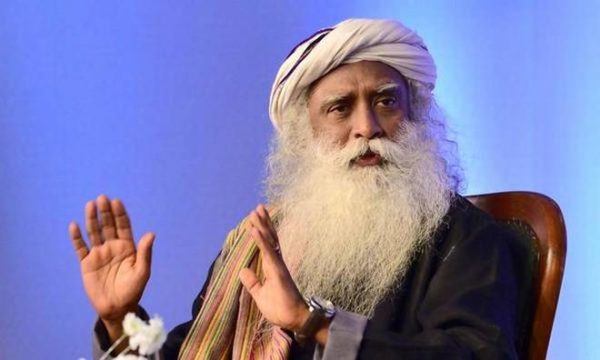Sadhguru Jaggi Vasudev explains shades of secularism and the strong spirit of enquiry in India
“Secular means, in my opinion, that you are not screwed up in your head,” Sadhguru Jaggi Vasudev said at The Huddle here on Friday. In a session titled “The sacred and the secular: Are the two irreconcilable”, Vasudev held forth about the actual meaning of what’s sacred and what’s secular.
“When you interpret it in a personal context, secularism is being inclusive. If you understand secularism as a political party, then you are wrong,” he said.
Arundhati Subramanium, poet and writer, was in conversation with Vasudev. The founder of the Isha Foundation defined sacred as a spirit of seeking knowledge and the truth. “Our knowledge is such a small thing, but our ignorance is boundless,” he said. “It is better to identify with the ignorant than the knowledgeable, because knowledge implies a boundary. Seeking is a consequence, not a choice. However, now there is neither courage nor a commitment to know, just to conclude.”
Over 50 or so minutes, Vasudev dealt with the banal and the transcendental with ease, coating it in humour — being flippant and deep all at once. Vasudev left the audience of believers and sceptics both amused and thoughtful.
Describing the difference between belief and confidence, Vasudev said, “Believing is convenient, because when you believe you will become confident. Confident without clarity is a disaster. There is too much of this disaster happening in this world. Because you can shout a slogan and become very confident even if you can’t see a thing. There is no substitute for clarity. Clarity means a constant pursuit, but confidence is a closure. It may give you the advantage of looking smart in front of other people, but the most idiotic are always very confident. Confidence is a very stupid thing. If you have clarity you will find your way through many things. If you have confidence without clarity you’ll blunder your way through many things,” he said.
Trek to Tibet
However, the tendency in India is to seek clarity. The Indian spirit of enquiry is rather strong. To illustrate, Vasudev recounted a story of a trek that he was on in Tibet. There was a big bunch of people from all over the world in his group. At one point, an Indian who lives in the United States, asked a question. “That question takes over eight minutes. It’s a question within a question within a question. The Indians are sitting nonchalantly, but the others were bewildered. I said don’t worry, this is an Indian question!”
“Maybe some people are trying to manage the questions. It’s a problem. When you don’t have answers, you don’t like questions. Whenever in the past someone has asked questions, especially religious question, usually the questioner dies. That’s a convenient way of answering a question. People must understand that a question is just a tool to drill deeper.” There is an impulse to turn to the past for answers. The scriptures are not the places to look for solutions, Vasudev said. “The scriptures don’t come from a time when there was a printing press and everyone could read and write. It came from a time when most people didn’t and the few who did wrote down whatever they thought was wisdom. Over time, this one book became 80 books. Then someone wrote a commentary about it. That is how the scriptures grew. There is some nugget of wisdom here and there, but if you really asked three questions, 90% of the world’s scriptures would collapse. I am unpopular among Hindus, Muslims and Christians because this is what I believe. The thing is, when something goes wrong in people’s lives, they find a little guy and blame him. If big things go wrong in their lives, they blame the big guy up there [God]. This guy (points at self) has been missing for a long time. Only when this guy [the self] comes in can something sacred happen,” Vasudev concluded.






Leave a reply